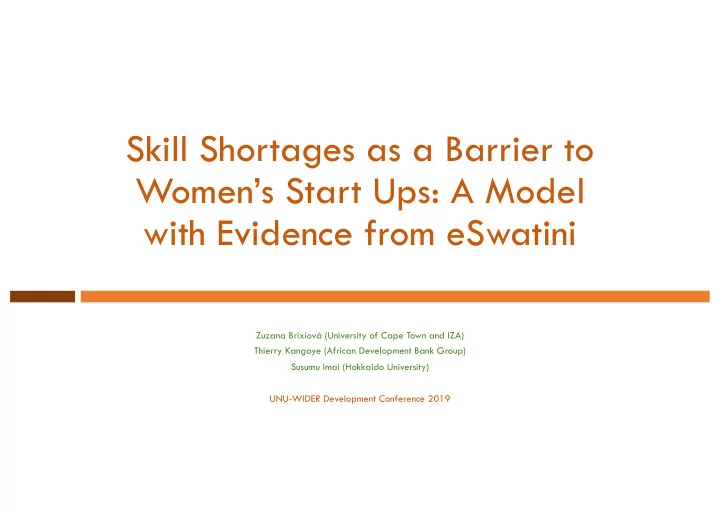

Skill Shortages as a Barrier to Women’s Start Ups: A Model with Evidence from eSwatini Zuzana Brixiová (University of Cape Town and IZA) Thierry Kangoye (African Development Bank Group) Susumu Imai (Hokkaido University) UNU-WIDER Development Conference 2019
Outline § Motivation and contribution of the study § Literature § Data and empirical strategy § Findings § Conclusions and policy messages 2/13
Motivation and contributions § Entrepreneurship as a source of inclusive growth (women, youth) § Understanding entrepreneurial gender gaps and their drivers in Africa § Use of a recent survey from the urban Eswatini 3/13
Literature § Gender-related performance gaps in entrepreneurship: no clear-cut evidence (OECD, 2005; Sabarwal and Terrell, 2008; Bardasi et al., 2009; Hallward-Dremier, 2011) § Training, skills and entrepreneurial performance: mixed evidence (Fairlie et al., 2015; Giné and Mansuri, 2014; De Mel and al., 2015; Verheul and Thurik, 2001) 4/13
Data § Micro-survey of entrepreneurs (UN Swaziland, 2012): objectives, opportunities, constraints, location, years of operations, sector, employment, sales, etc. § 640 small and medium-sized enterprises (SMEs) § 290 firms ( GEM concept of entrepreneurship ): 148 men-run and 142 women-run § Profit motive as a criterion for the identification of an entrepreneur 5/13
Stylized facts (1/3) § Female and male entrepreneurs differ along several dimensions: MALE FEMALE SE* Age of entrepreneur (years) 38.6 35.5 1.11*** Higher education 49.3 37.3 5.8** Firm stable or growing 69.3 60.4 5.76 * Sales (monthly, E th) 65.5 26.8 16.5 Sales same or higher than last year 52.9 43.3 3.23 * Employment (av. 2012) 2.08 1.04 0.48 ** Skill shortage as barrier 18.5 16.7 2.26 Received business training 24.2 20.4 4.93 Young (35 years or less) 48.6 58.5 2.93 ** Start-up capital (E th) 68.7 22.9 6.0 *** Personal contribution (Y/N) 63.7 60.1 2.9 Amount of personal contribution (E th) 42.7 18.7 4.76 *** Applied for informal credit 4.1 9.4 1.5 ** 6/13
Stylized facts (2/3) § Firms performance and training: male entrepreneurs outperform female counterparts: .3 .4 .3 .2 Density Density .2 .1 .1 0 0 -10 -5 0 5 10 -10 -5 0 5 10 Monthly sales (Log) Monthly sales (log) Male Female Male (trained) Female (trained) 7/13
Stylized facts (3/3) § Mean values of key characteristics of entrepreneurs and firms ( men/women by sales quantiles ): Age of entre- Age of Hours per Employment Start-up preneur business week working Variable Sales (E) (people) capital (years) (months) in the firm Women (mean values) Bottom 10% 213 35 23 0.4 32.8 7,734 10-25% 1,257 33 24 0.7 35.9 7,19 75-90% 29,778 34 15 1.4 52.4 47,556 90%+ 273 42 26 1.9 47.9 65,2 Men (mean values) Bottom 10% 133 39 26 1.1 22.4 7,822 10-25% 1,481 37 27 0.4 45.2 14,517 75-90% 38,743 41 22 1.6 46.0 94,5 90%+ 504,133 42 26 8.1 50.4 238,067 8/13
Identification strategy § Focus on sales levels and growth (entrepreneurial performance) and early-stage entrepreneurship § Links between performance, training and skills § Probit and Quantile Regressions: Firm performance = f(Training, Skill perception, Firms characteristics, entrepreneur characteristics) 9/13
Findings (1/2) § Do entrepreneurs’ skills and training matter for firm performance (growth of sales)? 1. Business training: positive and statistically significant impact on performance of men entrepreneurs, but not on women. 2. Self-confidence matters for female entrepreneurs: Negative perception of lack of skills as a barrier negatively affect performance. 3. Access to informal credit during the start-up stage is linked with a stronger performance among women entrepreneurs. 10/13
Findings (2/2) § Do entrepreneurs’ skills and training matter for firm performance (sales distribution)? 1. Business training: only positive for male entrepreneurs and at lower ranges of sales. 2. No evidence that perception of skill shortages negatively affects sales performance of women (only high-performing male entrepreneurs). 3. Different roles of specific proxies of soft skills (audacity, leadership and vision) on entrepreneurs’ performance. 4. Importance of education at higher sales (male and female). 5. Role of the nature of the access for financial services. 11/13
Conclusions and policy messages § Positive role of targeted training for productive start-ups and gender gaps. § Importance of soft skills for female entrepreneurial performance. § Fewer entrepreneurial skills: critical challenges for engagement in productive entrepreneurship for female entrepreneurs. § Broader training for women entrepreneurs (business, technical and soft skills) may be needed § Next for research: participation to global value chains and international entrepreneurship? 12/13
Thank you
Recommend
More recommend